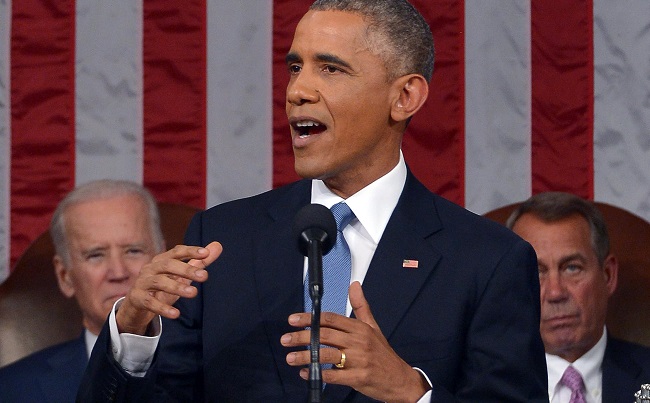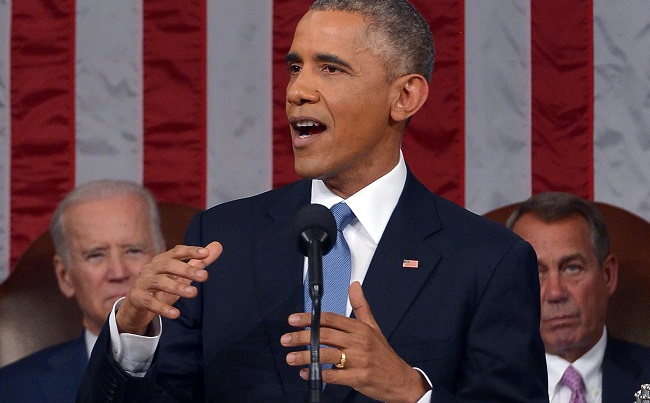
U.S. President Barack Obama delivers the State of the Union address on January 20, 2015 in the House Chamber of the U.S. Capitol in Washington, DC. (Photo by Mandel Ngan-Pool/Getty Images)
By now, you know exactly how the State of the Union under President Barack Obama will go. Select members of the Congressional Black Caucus will line up along the aisle seats, sticking out their arms with almost Gumby-like precision in order to secure an Obama handshake (as he both enters and leaves). Once Obama does approach the podium, we can look forward to an hour of Obama speaking, and subsequently, House Speaker John Boehner grimacing in all his orange glory.
The speech, more or less, reads as a wish list Republicans are sure to burn in effigy.
RELATED: SOTU Rewind: Comparing Obama’s Speeches Through The Years
However, there was a noticeable shift in tone between this State of the Union and those that preceded it. It’s best explained by Obama’s own declaration: “The shadow of crisis has passed, and the State of the Union is strong.” It was supported by the claims: “Our unemployment rate is now lower than it was before the financial crisis. More of our kids are graduating than ever before; more of our people are insured than ever before; we are as free from the grip of foreign oil as we’ve been in almost 30 years.”
It reportedly is the shortest State of the Union Obama has given, but no less multi-layered.
Obama spoke of “middle class economics,” how they work, and how the country needs to continue to promote them. I personally find talks of the “middle class” a fairytale working class Americans prefer politicians tell them over and over again for the sake of comfort. In any event, use this as a means to tout the need for guaranteed paid sick leave and paid maternity leave, noting America is the only advanced country on the planet that provides neither.
Obama also called on Congress to raise the minimum wage and issued the following challenge to his Republican dissenters: “If you truly believe you could work full-time and support a family on less than $15,000 a year, go try it. If not, vote to give millions of the hardest-working people in America a raise.”
On higher education – particularly community college – Obama said he would soon reveal his plan to Congress to make “two years of college becomes as free and universal in America as high school is today.”
With respect to infrastructure, Obama pushed for more funds to be allocated so that America can boast “modern ports, stronger bridges, faster trains, and the fastest Internet.”
When it came to foreign policy, he said, “I call on this Congress to show the world that we are united in this mission by passing a resolution to authorize the use of force against ISIL.” Obama went on to praise the benefits of his hand in shifting America’s relationship with Cuba as well as returning to his promise to close Guantanamo Bay. He also advocated for greater protection against hackers.
Then came even more issues that made Republicans sit even more defiantly in silence: climate change, equal pay for women, and the progress of the marriage equality movement.
At one point, Obama stressed to those in the room about how great it would be for them to forget politics and to simply do the right thing. I imagine this is when just about everyone clocked out in order to start contemplating platforms for 2016.
This was a nice speech with many sound ideas, but the only one that Republicans will likely get behind centers on bombing ISIL. Republicans collectively still find gays icky, women wanting equal pay for equal work whiny, and climate change to be a figment of Al Gore’s imagination.
Still, there was one portion of the speech that stood out in particular as Obama directly mentioned Ferguson:
We may have different takes on the events of Ferguson and New York. But surely we can understand a father who fears his son can’t walk home without being harassed. Surely we can understand the wife who won’t rest until the police officer she married walks through the front door at the end of his shift. Surely we can agree it’s a good thing that for the first time in 40 years, the crime rate and the incarceration rate have come down together, and use that as a starting point for Democrats and Republicans, community leaders and law enforcement, to reform America’s criminal justice system so that it protects and serves us all.
It was good to hear this reference, though I’m troubled by the false equivalence presented with it. A Father’s fear for his Black son being persecuted by law enforcement is not the same as a wife’s worry about her husband cop coming home. And while we’re at it, this sounds rather patriarchal. Even so, at least he mentioned it, although it would’ve been more powerful to hear Obama say “Black lives matter.”
Maybe we’ll get that at his final State of the Union. Oh, as for the official Republican response to the State of the Union, delivered by new Iowa Senator Joni Ernst: She’s basically what Sarah Palin could be like if she had the discipline to stay on script and read her study materials.
She didn’t bore us to death like Bobby Jindal nor did she decide to randomly gulp down a liter of water in the middle of her remarks like Marco Rubio. A star is born?
RELATED: Obama Seeks To Tax The One Percent And Offer Breaks To Middle Class
























